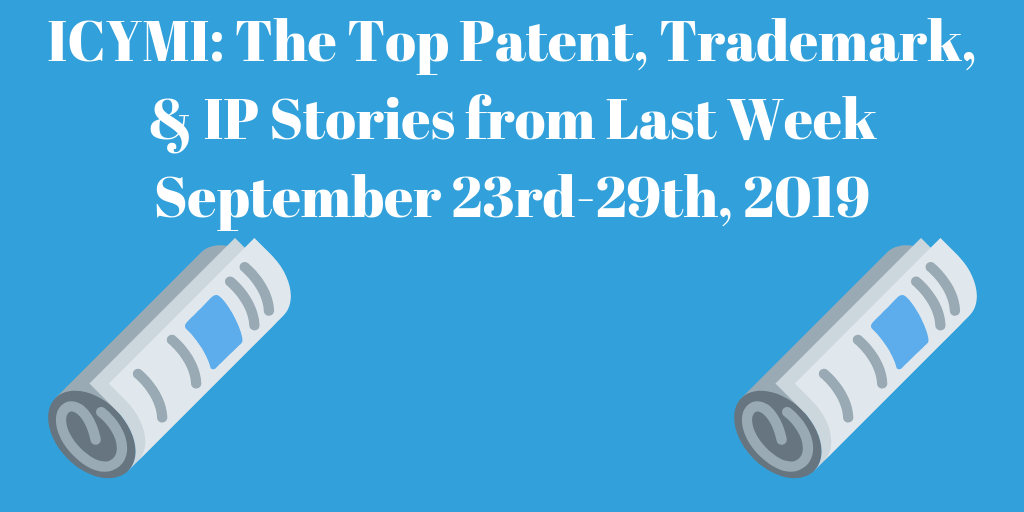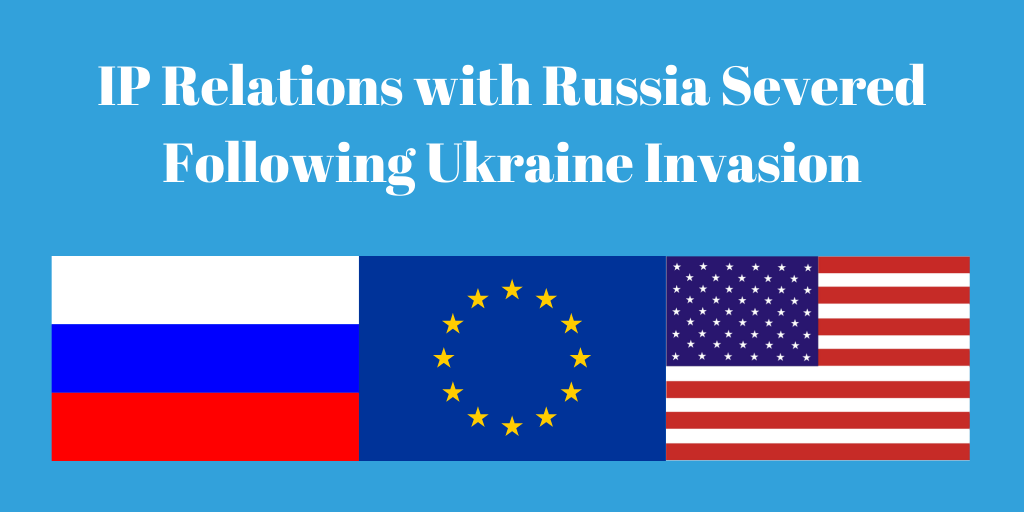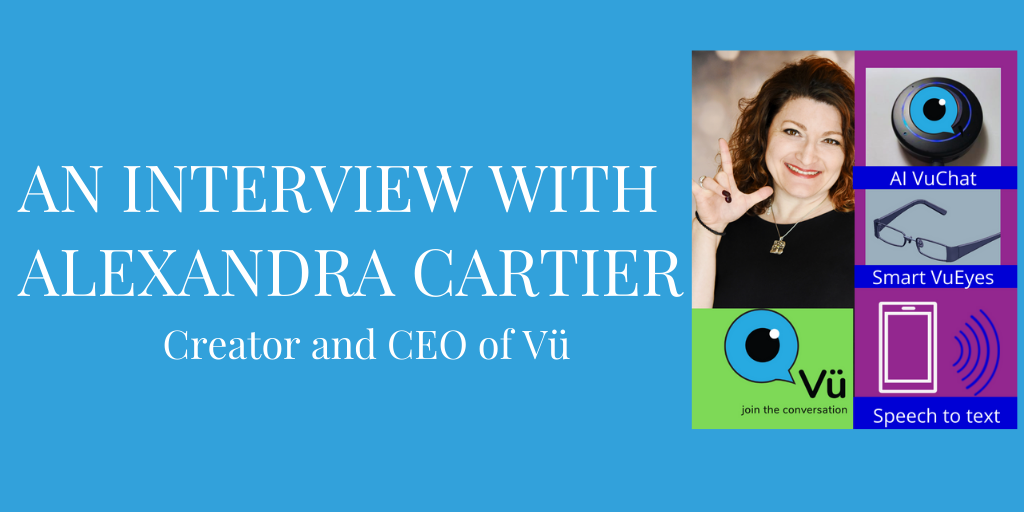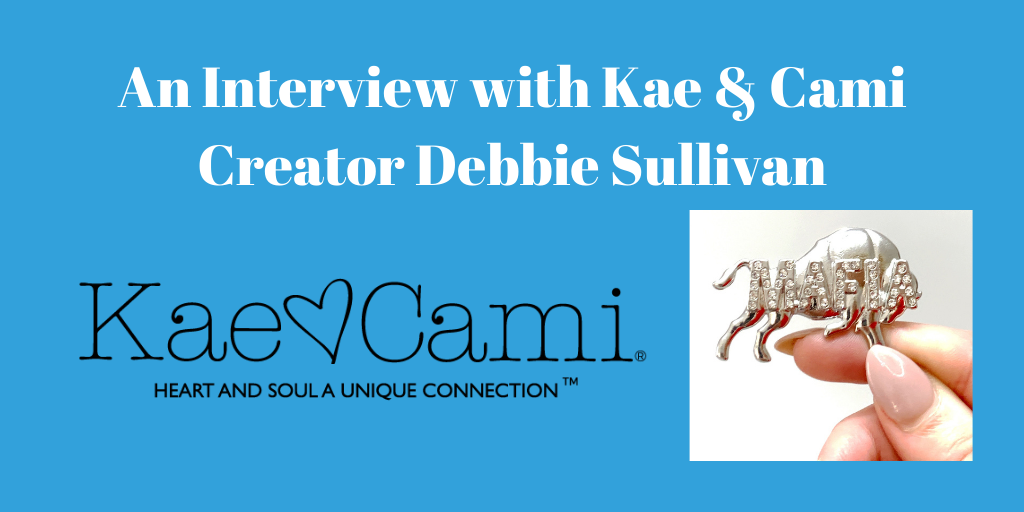Top Patent, Trademark, and IP Stories from Last Week (9/23-9/29/19)
Every week, we will be highlighting the top patent, copyright, trademark, intellectual property, etc. stories of the previous week in our “In Case You Missed It” segment. The list itself is in no particular order and includes a wide range of stories from the patent world that are informative, noteworthy, or just plain bizarre. The stories included encompass everything from Supreme Court cases to insights into growing industries. Please feel free to comment your thoughts on the stories or share an important one we missed!
“Iancu Touts Patent Eligibility Guidance That Just ‘Works”
In an address to the Intellectual Property Owners Association last week, USPTO Director Andrei Iancu remarked that the revised subject matter eligibility guidance issued in January has helped lower the number of patent application rejections this year. This is especially true for artificial intelligence patents that saw a rejection rate of 32% prior to Alice Corp. v. CLS Bank International and a rise to 60% in the 5 years after the case’s ruling. Since the new guidance was issued, Iancu indicates the number of rejections is falling back down to that 32% range once again. He went on to state that courts are not obliged to use the guidance and are still independent in their rulings, complicating things.
There is still no clear definition for what an “abstract idea” is however the USPTO did group abstract idea exceptions as “mathematical concepts, certain methods of organizing human activity, and mental processes” in their revised guidance. The agency also provided a series of hypothetical inventions to serve as examples of abstract ideas which you can see here.
Bills such as the STRONGER Patents Act of 2019 have been proposed by Congress to help clarify what is patent eligible however none have passed and uncertainty still lies. Such ambiguity continues to leave software and other sophisticated technology inventors uneasy but the revised guidance is clearly a step in the right direction. To read more about this story, click here (via Law360.com, September 25th, 2019).
“New Patent Suggests PlayStation Assist Is Sony’s Answer to Alexa and Cortana”
A new patent filing from Sony outlines a virtual assistant much like Amazon’s Alexa and Microsoft’s Cortana that will aid PlayStation users in-game. Dubbed “PlayStation Assist,” the device will help navigate gamers through complex video games as they become more sophisticated and the options limitless. For example, the Assist may show users where they can find an item or how to circumvent an obstacle they are stuck at.
When a player is stuck at some point in the game, for example, they can request help from the Assist “through a query to a back-end game assist server.” This query can be made in the form of audio, text, or video, and the game assist server is “configured to match the query to modeled responses based on a current game context from which the query was presented.” This matching is done via a deep learning engine and artificial intelligence. The engine will be configured to “match the query to the response given the current game context.”

Sony indicates the Assist will also be capable of applications outside of leveling up in the game. Users may request information about the game such as its popularity and character information, what friends play the game, and even “scheduling a time to play with friends in a multi-player format through a cloud gaming service.” Sony states the device will provide gamers with “more immersive experiences” that extend beyond the game itself. That said, the company also indicates the use of Assist through a mobile device in sync with the game. To read more about this story, click here (via EuroGamer, September 29th, 2019).
“Intellectual Property Rights Strongly Benefit the European Economy, EPO-EUIPO Study Finds”
The European Patent Office (EPO) released a report last week indicating that industries that make “intensive” use of intellectual property rights (patents, copyright, trademarks, etc.) generate 45% of the EU’s annual GDP, €6.6 trillion, and account for 63 million jobs (29% of all jobs). Industries that make intensive use of patents alone employ 24 million people in the EU and make up 16% of the EU’s GDP.
The report goes on to highlight that between 2014-16, employment in “IPR-intensive” industries grew by 1.3 million jobs compared to 2011-13. IPR-intensive industries also account for 81% of the EU’s trade with other nations and provided an overall trade surplus of €182 billion in 2016. To read more about this story, click here (via European Patent Office, September 25th, 2019).
“University of California Awarded 15th U.S. CRISPR-Cas9 Patent”
The University of California has been awarded its 15th CRISPR-Cas9 patent by the USPTO. CRISPR-Cas9 is a method of gene editing that uses the enzyme Cas9 to cleave target DNA at a specific location so that DNA may be added or removed from that strand. The changes may result in a certain harmful gene not being expressed thus treating disease.

The patent, “Methods and compositions for RNA-directed target DNA modification and for RNA-directed modulation of transcription,” covers a DNA-targeting RNA that includes a targeting sequence and “provides for site-specific modification of target DNA and/or a polypeptide associated with the target DNA.” The number of CRISPR patents granted to the University of California is expected to rise to 18 in the coming months according to USPTO filings. The European Union and many other countries including China and Japan have also granted the university patents. To read more about this story, click here (via Berkeley News, September 24th, 2019).




